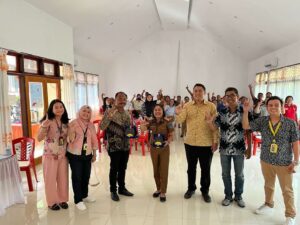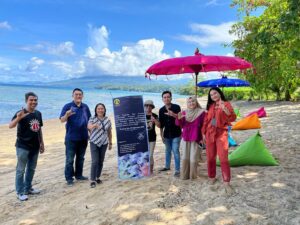
East Likupang District, North Sulawesi is known as a Special Economic Zone (SEZ). Apart from its status as an SEZ, East Likupang is also one of the Super Priority Tourism Destinations (SPTD). Both statuses certainly provide good prospects and leaps in terms of the economy. On the other hand, these conditions also provide challenges in terms of environmental sustainability and community economic empowerment. This is because the waste problem is still a “homework” that must be resolved.
To find solutions to these problems, the UI Blue Economy East Likupang Community Service Team provided assistance and socialization to residents in East Likupang District, North Minahasa District, North Sulawesi Province. Through this service activity, the UI Service Team provides support to the government and the East Likupang community to make regulations regarding Waste Disposal Sites; implement waste sorting; and improve the community’s economy through increasing the added value of marine resources as the main livelihood.
The activity with the theme “Efforts to Strengthen the Blue Economy: Assistance in Implementing Sustainable Development Goals (SDG’s) in Communities and Regional Apparatus in Kalamata East Likupang, North Sulawesi as a Special Economic Zone (SEZ)” involved lecturers, servants, and students from the Faculty of Administrative Sciences, Universitas Indonesia (FIA UI) The team was led by Vishnu Juwono, S.E., M.I.A., Ph.D. with four members, namely Dr. Adiwarman, S.H., M.H.; Althof Endawansa, S.I.A.; Violita Sinda Arinda, S.I.A.; and Juditha Danuvanya.

“With two huge mandates, the status of East Likupang as a SEZ (Special Economy zone) and one of the SPTDs (Super Priority Tourism Destinations), it is hoped that this community service activity held on 27-28 September 2022 can help East Likupang District and its people to encourage development of Blue Economy as well as marine tourism, without excluding the aspect of caring for the surrounding environment,” said Vishnu who is also a Lecturer in Public Administration at FIA UI.
According to the Head of East Likupang Sub-District, Delby Wahiu, Waste Disposal Sites in East Likupang is still very limited and even the district government does not have special regulations governing Waste Disposal Sites. Therefore, the East Likupang Regional Government feels greatly helped by the presence of the UI Blue Economy Community Service Team which has provided community assistance in East Likupang. “We are very happy because the community service from the UI Pengmas Team is able to bridge various parties related to strengthening the Blue Economy,” Delby said.
In this activity, the service team members explained the application of Blue Economy for the sustainability of the marine ecosystem and explained the application of regulations related to SDG’s and waste management in East Likupang as an SEZ. The materials presented were well received by the local residents. “We are very happy with UI community service activities that can help develop our village in the future,” said Hukum Tua or Head of Rinondoran Village, East Likupang District.

In fact, Dian, a small and medium enterprise (SME) owner in Pal Beach, Marinsow Village, hopes that the government can provide funding support for business development and landfill management. Meanwhile, another East Likupang resident, Jimmy Karundeng, hopes that the knowledge given by the UI Community Service Team on waste management that has an impact on environmental maintenance can help residents to contribute to the development of tourist areas in East Likupang.
As the further step from this activity, the community service team of Blue Economy Likupang Timur UI with the local government of North Minahasa District, East Likupang Sub-district and the Representative Counsil of North Minahasa, East Likupang area made an agreement in making regulation related to garbage dump; supporting the garbage management system; as well as promoting community training in the economic field as a form of sustainability of this community service activity.



